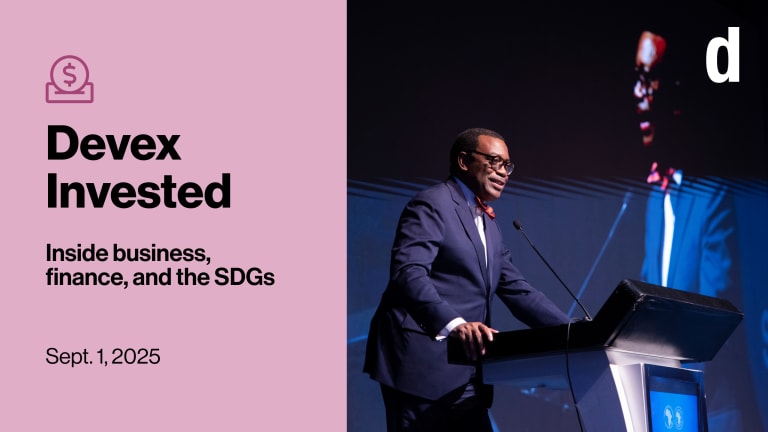Bloomberg blazes trail for more ambitious corporate-to-charity plans
Philanthropy experts weigh in on the potential impacts of Michael Bloomberg's decision to transfer his $12 billion company to Bloomberg Philanthropies.
Billionaire philanthropist Michael Bloomberg’s decision to hand off his lucrative company to Bloomberg Philanthropies upon his death — “if not sooner” — could be a game changer for a philanthropy sector and especially the causes that he cares about, such as public health and fighting climate change, philanthropy experts told Devex. Bloomberg is preparing to transfer ownership of his media and financial information services company Bloomberg L.P., which generated more than $12 billion in revenue last year, “likely” to a trust that will finance his philanthropic organization, Financial Times reported last week. It would be one of the largest charitable donations in history. The transfer would allow Bloomberg Philanthropies to “operate for perpetuity.” The move would be similar to Patagonia founder Yvon Chouinard’s decision last year to transfer his family’s ownership of the then- $3 billion outdoor apparel company to a trust and a nonprofit organization that would focus on climate change and conservation. Bloomberg also has advocated for those causes and could exponentially increase the pot of money available for them with his gift. Bloomberg has “committed to giving the company away to Bloomberg Philanthropies when he dies, if not sooner,” company spokesman Ty Trippet told Financial Times. Bloomberg Philanthropies spokesperson Rachel Nagler confirmed the plan to Devex but declined to provide further details. Putting Bloomberg L.P. under the same “umbrella” as his philanthropy could be hugely significant for the “longstanding” global causes that he has centered in his philanthropic work, said Melissa Berman, president and CEO of Rockefeller Philanthropy Advisors, or RPA. RPA does not advise Bloomberg Philanthropies. But the two organizations have a “relationship,” Berman told Devex. Bloomberg Philanthropies has helped fund some of the work that RPA leads, including its climate projects. The 81-year-old Bloomberg, who is worth an estimated $94 billion, is known for his public health and climate change advocacy and is currently a special climate envoy for the United Nations. His personal priorities have been reflected in the billions of dollars he has devoted to philanthropy. He has given away more than $14 billion so far, including about $1.7 billion just last year. His priority issues have included reducing air pollution and improving road safety in low- and middle-income countries, reducing tobacco use, and addressing preventable diseases and deaths. Climate causes Bloomberg Philanthropies also is among a coalition of funders that last year committed to raising $1 billion to help “safeguard the ocean from climate change” by 2030. Once the philanthropy arm of his operations can collect profits generated by his company, the charitable spending can be “taken up to scale,” so that it aligns with the enormity of the issues Bloomberg seeks to address, Berman said. Some of the areas Bloomberg Philanthropies might pour more money into are pollution reduction efforts and the “nexus” between ocean conservation and climate, said Heather Grady, who leads RPA’s environment and climate change work. Grady, who noted that Bloomberg Philanthropies has provided funding for some of the climate projects that RPA leads, said she was aware that these were areas that “they’re at least looking at.” But the impact of Bloomberg’s decision could extend past just his priorities. By creating this kind of charitable vehicle, he is also influencing other ultra-wealthy corporate executives still deciding how they can use their wealth to further their charitable, social, and political goals beyond their deaths, Berman said. “I think that we are seeing an interesting convergence among a lot of really committed people to having their business and their philanthropies, and their advocacy and their political work all under one umbrella,” Berman said. ‘A powerful message’ Bloomberg launched the company that would eventually become Bloomberg L.P. in 1981. Its primary money-making product was and remains its financial information and data services. Bloomberg eventually expanded the company into a media empire with print, radio, and television divisions. He has pledged to give away most of the wealth he has acquired within his lifetime or upon his death. Even before the announcement, the “vast majority of the company’s profits were committed to support the work of Bloomberg Philanthropies,” according to the nonprofit’s website. His announcement last week “sends a powerful message on the depth of his commitment to helping the world achieve transformational climate progress,” Helen Mountford, president and CEO of ClimateWorks Foundation, told Devex in a statement. Bloomberg Philanthropies is a funder of ClimateWorks, a nonprofit organization that includes a team of researchers, strategists and grant-makers. Bloomberg Philanthropies has a representative on ClimateWorks’ board, and the two have partnered on an initiative to accelerate the transition to clean energy in 10 economies across Africa, Asia, and South America. Bloomberg’s decision to further that kind of work with his gift is “the type of bold, inspirational commitment we urgently need philanthropists to make in order to help protect the lives and livelihoods of people around the world for generations to come,” Mountford said. How the transfer might work Still, it is unclear exactly how this transfer will be structured and how it will ultimately impact Bloomberg Philanthropies’ operations. Currently, Bloomberg Philanthropies includes Michael Bloomberg’s foundation as well as his corporate and personal giving. It also includes Bloomberg Associates, a “pro bono consultancy that works with mayors in cities around the world,” according to the philanthropy’s website. Bloomberg previously served as New York City’s mayor. Final giving plans from other wealthy, aging donors might offer some clues. Last year, the then-83-year-old Chouinard decided to turn his for-profit company into a charitable vehicle. The company’s estimated $100 million in profits per year would then be used to “combat climate change and protect undeveloped land around the globe.” It’s possible that Bloomberg might similarly decide to create a perpetual trust from which money could be pulled for charitable purposes, said Brian Mittendorf, a professor of nonprofit accounting at The Ohio State University. Another option would be to create something similar to the Newman’s Own Foundation, which is funded by profits from the Newman’s Own brand of food and beverage products launched by the late actor and philanthropist Paul Newman, Mittendorf said. In that case, the company was specifically created for charitable purposes. The foundation and the company do not share leadership. The major difference between the two models is that the nonprofit organization the Chouinards created to spend their charitable funds is classified as a 501(c)(4), which under U.S. law means it is allowed to make unlimited political contributions. Newman's Own Foundation, as a 501(c)(3) nonprofit, is restricted in how much political and lobbying activities it can engage in. As with Newman’s Own, leadership of Bloomberg Philanthropies and Bloomberg L.P. are separate. But there is overlap. Bloomberg Philanthropies CEO Patricia Harris sits on the management committee of Bloomberg L.P. She also previously served as deputy mayor of New York City under Michael Bloomberg, when he was mayor. A tax strategy? When Chouinard announced his plan last year, some panned it as a maneuver to influence politics and avoid paying U.S. estate taxes. Those same criticisms will likely be lodged against Bloomberg. Mittendorf acknowledged that Bloomberg’s family could potentially avoid paying billions of dollars in estate taxes by transferring his company to his philanthropic organization. But without knowing all of the details, it’s difficult to say just how much money would be saved, he added. Berman, however, rejected the idea that tax avoidance was Bloomberg’s primary motivator. “I don’t believe that this is a tax strategy,” she said. Rather, this decision would seem to align with his stated goal of directing most of his wealth toward creating social change, she said. Bloomberg spoke of how “satisfying” he found philanthropy when he signed on to the Giving Pledge, spearheaded by fellow billionaires Warren Buffett, Melinda French Gates, and Bill Gates in 2010. “Rockefeller, Carnegie, Frick, Vanderbilt, Stanford, Duke—we remember them more for the long-term effects of their philanthropy than for the companies they founded, or for their descendants,” he wrote in a letter about his pledge. And with his final, and perhaps largest charitable contribution to Bloomberg Philanthropies, Michael Bloomberg could usher in a movement among other business leaders, Berman said. His decision might be even more influential than Chouinard's, both because his company is more profitable than Patagonia and because of his public stature, she said. It will be interesting to see “whether he will try to use a lot of his reputational capital to encourage others to make the same decision about their companies,” Berman said.
Billionaire philanthropist Michael Bloomberg’s decision to hand off his lucrative company to Bloomberg Philanthropies upon his death — “if not sooner” — could be a game changer for a philanthropy sector and especially the causes that he cares about, such as public health and fighting climate change, philanthropy experts told Devex.
Bloomberg is preparing to transfer ownership of his media and financial information services company Bloomberg L.P., which generated more than $12 billion in revenue last year, “likely” to a trust that will finance his philanthropic organization, Financial Times reported last week. It would be one of the largest charitable donations in history. The transfer would allow Bloomberg Philanthropies to “operate for perpetuity.”
The move would be similar to Patagonia founder Yvon Chouinard’s decision last year to transfer his family’s ownership of the then- $3 billion outdoor apparel company to a trust and a nonprofit organization that would focus on climate change and conservation. Bloomberg also has advocated for those causes and could exponentially increase the pot of money available for them with his gift.
This story is forDevex Promembers
Unlock this story now with a 15-day free trial of Devex Pro.
With a Devex Pro subscription you'll get access to deeper analysis and exclusive insights from our reporters and analysts.
Start my free trialRequest a group subscription Printing articles to share with others is a breach of our terms and conditions and copyright policy. Please use the sharing options on the left side of the article. Devex Pro members may share up to 10 articles per month using the Pro share tool ( ).
Stephanie Beasley is a Senior Reporter at Devex, where she covers global philanthropy with a focus on regulations and policy. She is an alumna of the UC Berkeley Graduate School of Journalism and Oberlin College and has a background in Latin American studies. She previously covered transportation security at POLITICO.








